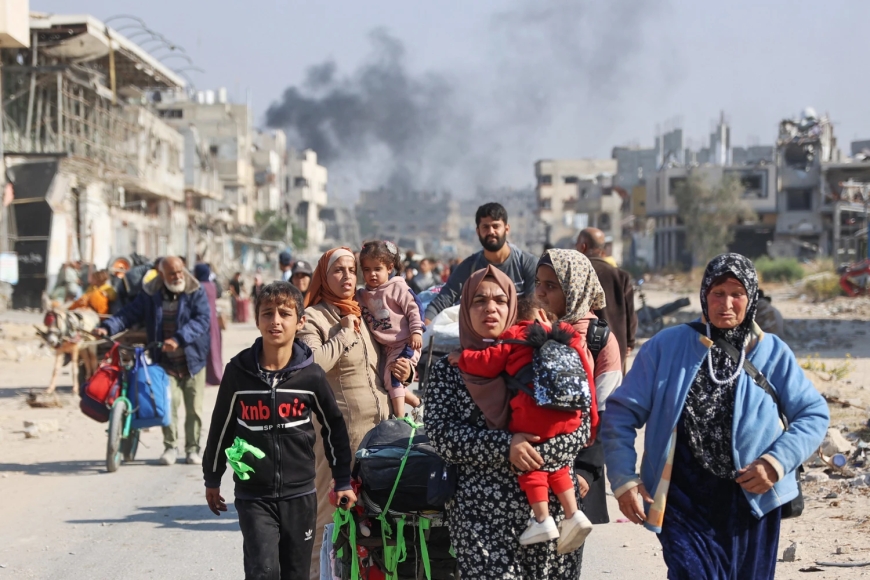Ethnic Cleansing in the 21st Century: Understanding Gaza's Humanitarian Tragedy
The Gaza Strip a diminutive yet densely populated territory has for years endured a grievous humanitarian and healthcare catastrophe exacerbated by an unrelenting economic blockade and recurrent military aggressions.

The Gaza Strip a diminutive yet densely populated territory has for years endured a grievous humanitarian and healthcare catastrophe exacerbated by an unrelenting economic blockade and recurrent military aggressions.
By 2024; Gaza's healthcare system had reached a nadir so dire that even Western governments notably the United Kingdom were compelled to respond. This harrowing state of affairs epitomizes Israel's genocidal campaign in Palestine raising an urgent moral quandary for the global community: whether the dictates of realpolitik shall triumph over humanity and justice.
The systematic degradation of Gaza’s healthcare infrastructure—brought about by years of economic strangulation and incessant military aggression—has been compounded since October 2023; when the Israeli regime escalated its deliberate targeting of medical and other civilian facilities. Hospitals and clinics across the Palestinian enclave now face an acute dearth of essential medicines. According to the World Health Organization many healthcare institutions are operating at a mere 50% of their capacity. Reports from international organizations and human rights groups depict a tableau of appalling conditions: overcrowded hospitals shortages of critical medicines insufficient emergency surgical capabilities and rampant outbreaks of diseases such as cholera and diarrhea. Particularly vulnerable to this crisis are children pregnant women and the elderly who bear the brunt of these systemic deficiencies.
Further exacerbating the plight is the contamination of water supplies by Israeli forces and the destruction of the waste management system which have engendered a proliferation of infectious diseases. Today children—constituting over half of Gaza’s population—are disproportionately at risk enduring malnutrition and illnesses precipitated by inadequate access or complete denial of sustenance and potable water. Worsening these tribulations are power outages and stringent restrictions on fuel imports which have paralyzed hospitals’ capacity to deliver emergency care. The cumulative effect of these hardships appears to be a deliberate infliction of suffering upon Palestinian civilians with children bearing a disproportionate share of the burden. This lends credence to the assertion that the Israeli regime’s war crimes are in fact a calculated campaign of demographic engineering aimed at diminishing Gaza’s population and altering its ethnic composition.
Israeli political rhetoric has on multiple occasions betrayed this agenda. Statements from government officials marked by a brazen disregard for international opprobrium have called for the annihilation of Palestinians—including women and children—in tones chillingly reminiscent of Nazi Germany's genocidal strategies. Such pronouncements have elicited widespread condemnation from the international community even from Western capitals traditionally aligned with Israel. Notably the British Permanent Representative to the United Nations recently underscored the untenability of Gaza’s humanitarian plight urging immediate measures to facilitate humanitarian access and alleviate the siege. While this appeal reflects a modicum of humanitarian concern it also underscores the inherent contradictions in Britain’s posture: as a staunch ally of Israel the United Kingdom continues to endorse Israeli war crimes under the pretext of “self-defense” thereby perpetuating the very conditions it purports to deplore.
The crisis in Gaza serves as an acute litmus test for the international community’s commitment to human rights and ethical governance. Apathy or acquiescence in the face of this unfolding humanitarian catastrophe not only abrogates moral responsibility but risks engendering graver global repercussions. The economic blockade ostensibly imposed to weaken Hamas has instead inflicted untold misery upon the civilian populace. It is incumbent upon the United Nations and influential global actors to adopt decisive measures to lift the siege ensuring that Gaza’s inhabitants gain unimpeded access to healthcare potable water and basic sustenance. Augmenting humanitarian aid and exerting diplomatic pressure on Israel to implement a durable ceasefire are imperative first steps. Concurrently robust international efforts must be marshaled to rehabilitate Gaza’s healthcare infrastructure immediately through organizations such as the Red Cross Red Crescent and the World Health Organization.
Ultimately; the health crisis engulfing Gaza constitutes a human tragedy never seen before in modern history demanding swift and coordinated intervention from the global community. Resolving the Gaza crisis necessitates a paradigm shift in diplomatic and political strategies prioritizing human dignity and universal rights over transient geopolitical gains. Western governments including the United Kingdom must reevaluate their policies channeling their influence toward sustainable and humane resolutions. Only through such transformative approaches can we aspire to ameliorate Gaza’s plight and pave the way for enduring peace in Palestine.













































